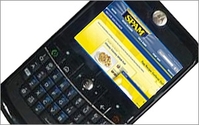Mobile Spam Lawsuit Against Path Moves Forward
- by Wendy Davis @wendyndavis, June 6, 2014
 Path has lost a
round in a mobile-spam lawsuit accusing it of sending consumers SMS messages inviting them to join the service.
Path has lost a
round in a mobile-spam lawsuit accusing it of sending consumers SMS messages inviting them to join the service.Last week, U.S. District Court Judge Samuel Der-Yeghiayan in the Northern District of Illinois rejected Path's argument that the case should be dismissed before trial. That ruling allows Illinois resident Kevin Sterk to proceed with a potential class-action lawsuit against the social-networking service.
Sterk's complaint, filed in March 2013, alleges that Path violated the Telephone Consumer Protection Act by using automated dialers to send SMS ads without the recipients' permission. Sterk alleges that Path sent him an unsolicited text stating that someone else -- Path user Elizabeth Howell -- wanted to show him photos on the service. The message also contained a link to a site where Sterk could register to join Path.
Path asked Der-Yeghiayan to grant it summary judgment on a technical ground: The company says its system doesn't use automated dialers. Path contends that its system only sends SMS messages to people if their phone numbers were provided by Path's users. The company says its reliance on “human intervention” -- users' uploading of their friends' numbers -- means its system isn't an automated dialer.
Der-Yeghiayan disagreed with Path's argument. He says that even if Path's users uploaded their friends' mobile numbers, Path still used an automated dialer to reach those people. “The undisputed evidence shows that the equipment used by Path’s agent made calls from the list without human intervention,” he ruled. “It is such calling that the section of the TCPA at issue in this case covers, not the collection of numbers for storage.”
The ruling, issued last week, only deals with one of Path's arguments. The company also said in court papers filed last year that any invitations it sends are initiated by users, and sent on their behalf.
Der-Yeghiayan said in September that Path's argument on that issue was premature, but his ruling left the company free to make the claim in the future.


